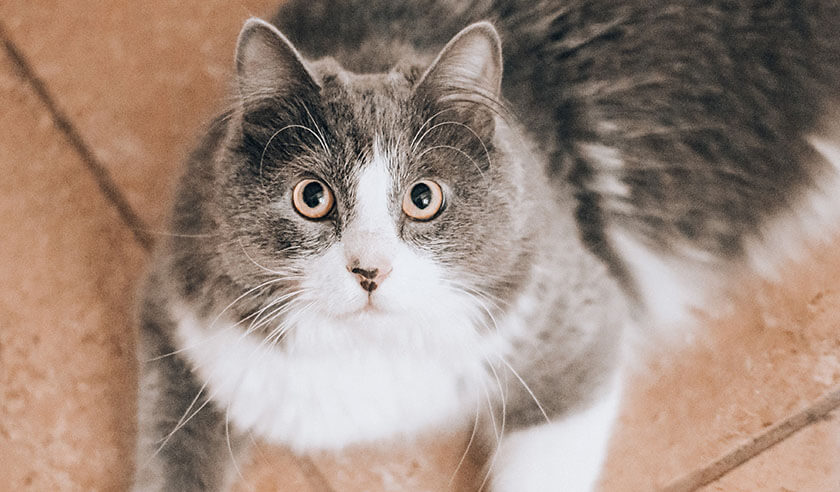While the thought of your cat having worms can be upsetting, it’s surprisingly common. Infection rates are known to be as high as 33%.1 That is why taking your cat to your veterinarian and using parasite prevention is so important. Whether your cat is indoor or outdoor or a former stray or purebred, knowing a bit about worms is an important part of caring for your cat.
Types of Worms That Can Infect Cats
Common gastrointestinal worms that affect cats include roundworms, tapeworms, and hookworms. Heartworms are another type of worm that can infect cats, impacting their heart and lungs.
Roundworm
The most common intestinal worm is roundworm.2 Almost all cats will be infected with roundworms at some point in their life, usually when they are kittens.3 While they may cause more mild disease in adult cats, they can be life-threatening in large numbers for kittens. These large-bodied worms live freely in the intestines. They average 3–6 inches in length.
Tapeworms
Tapeworms anchor themselves to the intestines with hook-like mouthparts. Individual tapeworm segments break off as the worm matures and are passed in the cat’s poop. The most common type of tapeworm that infects cats is the flea tapeworm, which is spread by fleas. If your cat has a tapeworm infection, you might notice these segments—they can look like grains of rice on your cat's poop or fur.
Hookworms
Hookworms affect cats worldwide, especially in warmer, moist climates. These tiny worms have hook-like mouth parts that secure them to the lining of the intestinal wall. Once attached to the intestine, hookworms suck blood and can cause anemia. Kittens are at highest risk of significant blood loss from hookworm infections.5,6
Heartworm
Heartworms can cause serious disease in cats and are often underdiagnosed. Cats can become infected when they are bitten by a mosquito carrying heartworm larvae. Typically, cats with heartworm infections only have one or two worms, but even a single worm can cause serious damage to the cat's heart and lungs.
How Do Cats Get Worms?
This depends on the type of worm that infects your cat.
Roundworms
Cats become infected with roundworms by eating infected rodents or ingesting roundworm eggs present in feces or contaminated soil. A mother’s milk can be infected with larvae which are then passed to kittens during feeding.
Tapeworms
As you might guess, flea tapeworms require fleas to be transmitted. Cats become infected with flea tapeworms after they eat a tapeworm-infected flea, as might commonly occur during grooming. The tapeworm eventually begins releasing egg packets, into the cat's feces. Flea larvae in the cat’s environment can eat these tapeworm egg packets and the cycle begins again.
Cats can become infected with other types of tapeworms by prey animals, like mice.
Hookworms
Hookworm infection in cats can occur when the larvae enter the body through the cat’s skin or via ingestion during grooming.
Heartworms
Cats can become infected with heartworms when they are bitten by a mosquito that is carrying heartworm larvae. Even indoor-only cats can be at risk for heartworm disease because mosquitoes can come indoors.
Signs Your Cat Might Have Worms
The signs cats exhibit with intestinal worms are nonspecific. This means they’re general signs, not indicative of a specific cause. These signs of worms in cats can include any of the following:
Signs of Gastrointestinal Worms
- Vomiting
- Diarrhea
- Mucous in stool
- Bloody stool
- Constipation
- Loss of appetite
- Pale gums
- Bloated belly
- Weight loss
- Dehydration
- Coughing
- Dull coat
- You may actually see them!
Young kittens, injured cats, or those with weakened immune systems are more likely to experience severe disease and symptoms from intestinal worms. For example, roundworms can cause stunted growth and development in kittens. Hookworms can cause anemia. Intestinal blockage can result from an accumulation of high numbers of tapeworms.
Signs of Heartworm Disease in Cats
- Coughing
- Trouble breathing
- Vomiting
- Sudden death
- Some cats may show no signs at all
Treatment of Worms in Cats
There are several types of deworming medications that are used to treat intestinal worms in cats. Your veterinarian will determine the best option based on your cat’s specific worm infection. Multiple doses of a deworming medication may be needed depending on the type of intestinal worm.
There is no treatment for heartworm disease in cats. The best way to protect your cat is to keep them on monthly heartworm prevention all year round.
If cats are symptomatic for worms, additional medications may be necessary to treat and manage those signs.
How a Parasite Preventative Can Protect Your Cat Against Worms
The best way to protect cats against worms is by being proactive. Providing your cat with a monthly broad-spectrum preventative (also called a parasiticide) can easily protect against dangerous parasites, including heartworms, roundworms, hookworms, and tapeworms.
Your cat should be tested for parasites every six to 12 months and kittens may need to be tested for gastrointestinal parasites more frequently. Regular wellness visits with your veterinarian are also important to ensuring your cat stays happy and healthy!
ZPC-02580
IMPORTANT SAFETY INFORMATION: The safe use of Revolution Plus has not been established in kittens less than 8 weeks old or in breeding, pregnant or lactating cats. Reported side effects in clinical trials included lethargy and anorexia. Use with caution in cats with a history of neurologic disorders. Revolution Plus contains sarolaner, a member of the isoxazoline class which has been associated with neurologic adverse reactions, such as tremors, ataxia, and seizures in cats with or without a history of neurologic disorders. In humans, Revolution Plus may be irritating to skin and eyes. See Prescribing Information.
REVOLUTION PLUS is indicated for the prevention of heartworm disease caused by Dirofilaria immitis, the treatment and control of roundworm (Toxocara cati) and intestinal hookworm (Ancylostoma tubaeforme) infections, and the treatment and control of ear mite (Otodectes cynotis) infestations. REVOLUTION PLUS kills adult fleas (Ctenocephalides felis) and is indicated for the treatment and prevention of flea infestations, the prevention of Dipylidium caninum (tapeworm) infections as a direct result of killing Ctenocephalides felis vector fleas on the treated cat, and the treatment and control of tick infestations with Amblyomma americanum (lone star tick), Amblyomma maculatum (Gulf Coast tick), Dermacentor variabilis (American dog tick), and Ixodes scapularis (black-legged tick) for one month in cats and kittens 8 weeks and older, and weighing 2.8 pounds or greater.
1. Retrospective analysis of feline intestinal parasites: trends in testing positivity by age, USA geographical region and reason for veterinary visit. National Library of Medicine. https://www.ncbi.nlm.nih.gov/pmc/articles/PMC7493338/. Accessed January 23, 2025.
2. Gastrointestinal Parasites of Cats Brochure. Cornell Feline Health Center. https://www.vet.cornell.edu/departments-centers-and-institutes/cornell-feline-health-center/health-information/feline-health-topics/gastrointestinal-parasites-cats-brochure. Accessed January 23, 2025.
3. Roundworm Infection in Cats. VCA Hospitals. https://vcahospitals.com/know-your-pet/roundworm-infection-in-cats. Accessed January 23, 2025.
4. Dipylidium Caninum. Companion Animal Parasite Council. https://capcvet.org/guidelines/dipylidium-caninum/. Accessed January 23, 2025.
5. Hookworm Infection in Cats. VCA Hospitals. https://vcahospitals.com/know-your-pet/hookworm-infection-in-cats. Accessed January 23, 2025.
6. Hookworms in Small Animals. Merck Manual. Veterinary Manual. https://www.merckvetmanual.com/digestive-system/gastrointestinal-parasites-of-small-animals/hookworms-in-small-animals. Accessed January 23, 2025.

.svg)




